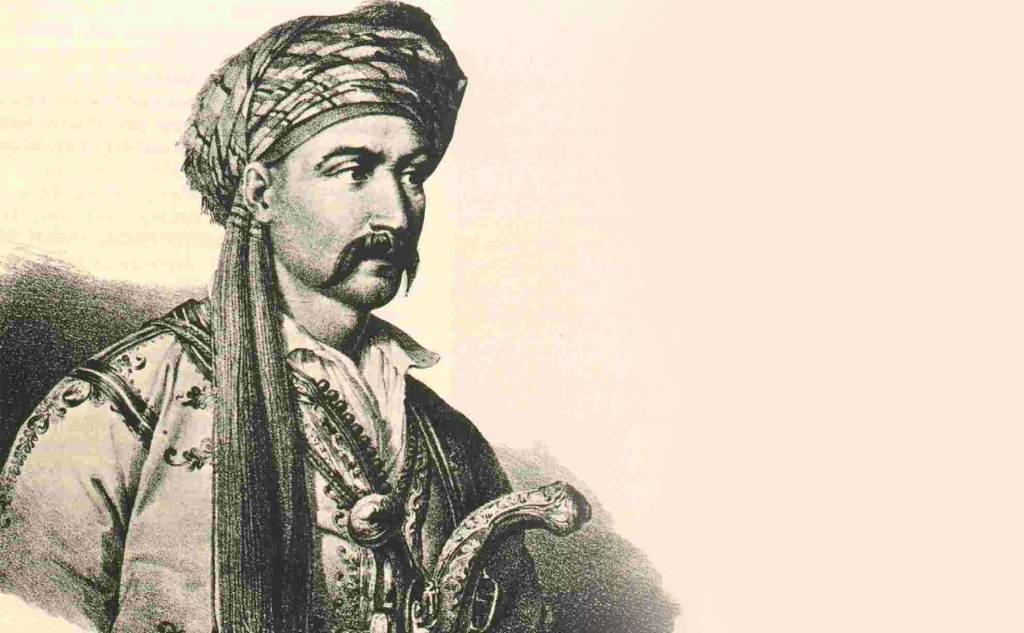Nikitaras - Hero of the Revolution of 1821

THE HEROIC "TURKOPHAGUS"
Nikitas Stamatelopoulos, known to all of us as Nikitaras, was born at the village of Megali Anastasova in the Piscines Villages of Mystras, (today's Nedusa Messinia), in 1781. We know this from his Memoirs, recorded by the historian George Tertsetis. His father was the Leontian region fighter, Stamatelos, and his mother, Sofia Dimitrios Karoutsos, from Akovos of Leontari, sister of Theodoros Kolokotronis' wife.
In 1816 his father was killed by the Turks during the persecution of the fighters of the Peloponnese. Thus, Nikitaras followed his uncle Kolokotronis to the Ionian Islands and joined the Russian battalions. He then went to Italy to fight against Napoleon's army. He returned to the Ionian Islands and served the French. He even maintained his own Armed Forces with men from various parts of Greece. He married the daughter of the fighter captain Zacharias, with whom he had three children, a son and two daughters.
On April 24th, 1821, he took part in the first battle fought at Valteci, Arcadia. At the Battle of Doliani in May 1821, Nikitaras managed to repel thousands of Turks. Because he killed so many on that day, his men called him "Turkophagus." When Tripoli was occupied by the Greeks he did not ask for any loot for himself and when he was offered a diamond sword, he donated it to the Provisional Government. Kolokotronis rightly called him "Archangel Michael" and "Saint George". Nikitaras took part in many battles until the liberation of the country (Dervenakia, Agionoros, Agios Sostis, etc.)
In 1834, he was awarded the rank of Colonel of the Tactical Army and was appointed Military Inspector. In September 1835, the award of the Silver Cross of the Greek Struggle was approved. The relevant diploma was signed by Queen Amalia and the embossed Great Seal was introduced in 1836. The original of the Diploma is kept in the General Archives of the State. An exact copy is kept at the Historical and Folklore Museum of the Local Community of Artemisia in the Municipality of Kalamata.
Under Kapodistrias and Otto he belonged to the Party of the Napaians (Russian friendly political party). Fearing that the Russian-speaking party was seeking to replace King Otto with a Russian prince, the Greek government arrested Nikitaras in 1839 and sentenced him to one and a half years in prison, which he served at Aegina prisons. In fact, it is said that one of his daughters went mad with grief after the imprisonment of her father. Nikitaras was involved in a conspiracy against Otto. In the ensuing trial, he was acquitted after all of the incriminating evidence had been destroyed. When he was released from prison he was in poor health. Without knowing it, he was suffering from diabetis, which resulted in a severe loss of vision. He was granted a "begging permit" every Friday at the area where today the church of Evangelistria is located in Piraeus. In 1843, when King Otto was forced to give Greece a constitution, he was awarded the rank of lieutenant general along with a meager pension. In 1847, he was appointed Senator. He was also President of the Hellenic Parliament.
He died on September 25th, 1849, at the age of 68. His last wish was to be buried next to his uncle, Theodore Kolokotronis, at the First Cemetery of Athens. The eulogy was delivered by Neophytos Vamvas and the mortuary by Panagiotis Soutsos. However, it seems that the death of his wife and children, as well as the lack of immediate offspring, caused no one to be interested and his grave was ignored and eventually lost. Nikitara's bust is found at the Pedion Areos, along Heroes Avenue and in Kalamata at March 23rd Square.



